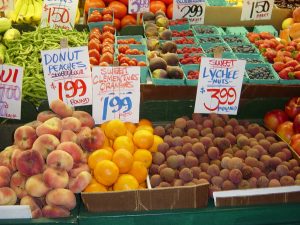Industrialized Food and the Problem of Supermarkets
While farmer’s markets and community gardens may be on the rise in U.S. cities, the vast majority of U.S. households still buy their food from chain supermarkets and supercenters, regardless of income level. Supermarkets provide a fast and accessible way to satisfy your hunger – one twenty minute trip can provide everything from fresh avocados and pre-cut steaks to frozen pizzas and kid friendly cereal. But are Americans paying the price for their convenient and cheap food? If not, who is?
Food writer Michael Pollan argues that the food on supermarket shelves is shorting Americans on nutrition and overall health. Produce and animal products grown in the industrialized food system suffer from extreme nutrient shortages due to depletion of soil quality, and incentives to harvest pre-ripened foods to allow to longer shelf life and long distance shipment. Meanwhile, in the supermarkets central aisles, processed foods contain a long list of non-food additives and substitutes that provide little to no nutritional value. Pollan is (with good reason) skeptical about processed foods with nutritional claims – think of the FDA supported embrace of hydrogenated vegetable oil based margarine in the late twentieth century, despite the links between trans fats and heart disease.
Alongside critics pointing out the the links between the American diet and “Western Diseases”, professionals like Professor Karen Litfin at the University of Washington highlight that the industrialization and commercialization of food hides the ecological damage and human labor behind the stocked supermarket shelves. Buying a pack of raisins at a convenience store is, for most people, entirely disconnected from the massive labor intensive process along California’s coast.
But in this industrialized food system, that binds many people to a few nationally owned supermarket chains due to time or convenience, what choice to people have? Unfortunately, the focus of our agency on a few simple questions: organic or regular?, QFC or Trader Joe’s?, reusable bag or paper? – is nearly ineffective. Not only are these questions restricted by privilege, but the actions of a few do little to change the mechanisms and incentives that keep the industrial food system alive – and leave us with the hidden consequences.


